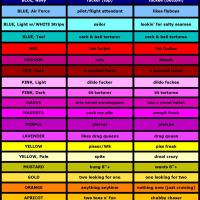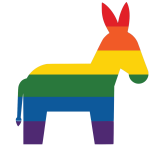
“The painful part of being a queer kid is not in the knowing you’re queer, it’s in the not knowing. You know you’re different but you don’t know why. The other kids know you’re different too, in fact, they never let you forget it. But no one gives you a language for it. No one gives you a mirror. And so you just sit there, quietly, being different. Not fitting. Trying to be invisible. And so you are, truly, alone.”
I recently saw the above quote, and sadly, I don’t know who said it. However, if you grew up LGBTQ+, and I know most of you did, you can probably identify with this. I didn’t understand how I was different when I was young, I just knew that everyone said so. I also knew I was attracted to guys, but I “knew” I wasn’t supposed to be and kept telling myself that I just admired how they looked or acted and wished I was the same way. I had no words for it because either no one spoke about gay people or it was such an awful thing that it never occurred to me that I was that way too.
Growing up, there was never even the slightest question as to whether I would go to college. No one could imagine I wouldn’t. The same was true about being gay. It was never something that I contemplated I could be. Kids used to call me gay, a fag, a queer, or a sissy, but I never thought any of those words pertained to me. They were just insults and hurtful. They made fun of the way I talked, walked, or moved my hands. Other kids made all of this sound so awful. I knew I was different, but I didn’t have the words to express how I was different. I think I knew that I didn’t want to be gay, a faggot, a queer, or a sissy. I also didn’t know how to change the way sound of my voice, how I walked, or my hand gestures. I tried, but to deepen my voice, it hurt my throat. Trying to walk more “manly” or not be expressive with my hands were done so unconsciously that it was a struggle to concentrate on not moving the way I moved.
Knowing I was different resulted in a few things that shaped my life. It made me incredibly shy and quiet, two things I’ve somewhat grown out of, though I can still be shy and quiet with people I don’t know. Being different and bullied caused a lifelong struggle with depression. It also encouraged me to hide in the world of books and to bury myself into studying. I read constantly, and I always made sure I got the best grades. Being smart though was a blessing and a curse. It was praised by some, but others just used it as another way to prove I was different. However, being smart was going to be my ticket out of my small hometown. They could make fun of me for being smart, but I never felt ashamed of that.
I didn’t begin to understand how I was different until college. I was able to do research on the internet. I could read books in private that helped me understand. I think one of the turning points was when I took an “Intro to Psychology” class. I can’t say I learned a lot from that class, but the professor allowed us to submit anonymous questions that he’d take time at the end of class to answer. Someone, and it was not me, asked, “How do you know if you’re gay?” The professor said that the subconscious mind can tell us a lot about ourselves, so think about what you dream. He said to ask ourselves what we dreamed at night. When we dreamed about a romantic partner or sex, was it about someone of the opposite or same sex? It made me think and to realize that I had never once in my memory dreamed of being with a girl. It was always a guy.
Many southern states are enacting “Don’t Say Gay” laws which prohibit teachers in elementary (and sometimes secondary) schools to discuss anything LGBTQ+. They are also banning books in libraries that discuss diversity. They are removing any of the resources kids need to understand why they are different and so alone. LGBTQ+ kids are more likely than straight kids to take their own life. If they could have a teacher they could talk to, adults who discussed with kids the diversity of sexuality, or the library had books a kid could read to help them understand, then maybe they’d realize they weren’t alone. If they saw that “Gay Is Ok,” then maybe they wouldn’t be so distraught and take their own life once they figured out why they are so different. I’d say that I don’t understand why homophobic politicians can’t see that they are killing kids by censoring what they can learn, but they wouldn’t care. These politicians tell themselves that if they keep kids ignorant of who they are, they can prevent them from being different. It doesn’t work that way. Instead, it harms these kids because they don’t understand or have the words to understand their feelings. I wish they would understand that this causes kids to harm themselves, but I also realize that these same politicians don’t care. If LGBTQ+ kids take their own life, then it’s one less person who doesn’t conform to their narrow minded beliefs.
Education, empathy, and understanding are some of the most important needs of young people. Those who are different and are forced to hide their true selves need to know that there is nothing wrong with them.























